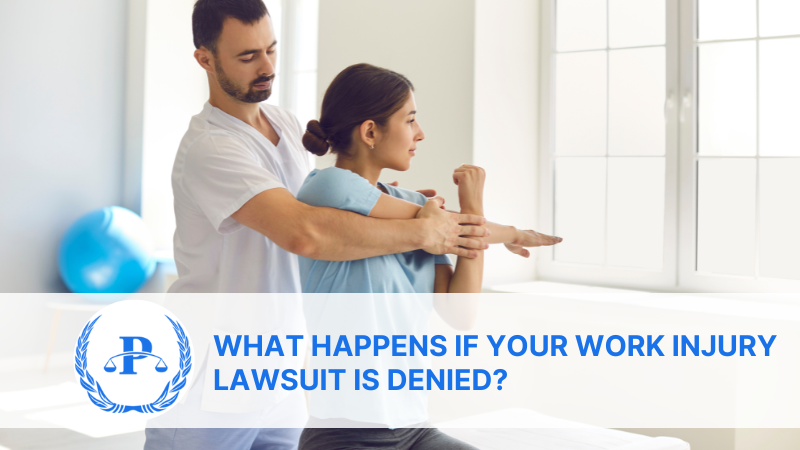Injury at work is physically and emotionally draining. Med expenses, missed wages, and pain and suffering are common reasons workers file workers’ compensation or job injury claims. But what if your workers’ comp or job injury lawsuit is denied? This is unfortunately common and can leave injured workers frustrated and unclear of their future steps. You must know your rights and options in this situation. This article explains the steps to take when your work injury lawsuit is denied.
What are the Steps to Take If Your Work Injury Lawsuit is Denied?
Having your work injury claim refused can be upsetting and distressing. There are ways to appeal a workers’ compensation or personal injury refusal and get the reimbursement you deserve. Let’s delve into the steps to take if your work injury lawsuit is denied.
- Read the denial letter carefully: Your employer’s insurance company or workers’ compensation board will write to you if your claim is denied. Explaining your claim denial in the letter. Read and comprehend the refusal letter’s reasons. This can help you assess if the denial was a mistake or if further action is needed.
- Consult an Experienced Work Injury Lawyer: After your work injury case is denied, you need a skilled attorney. Complex laws make DIY work injury lawsuit difficult. An experienced workers’ compensation or work related injury lawyer can evaluate your case, explain the denial, and suggest future measures. If the insurance company or employer committed a mistake or there are legal grounds to appeal, an attorney can help. Administrative errors like missing deadlines or bad paperwork can lead to denials.
- Collect and organize evidence: To contest the denial, gather as much proof as possible. Get injury doctor’s notes, test results, and prescriptions. Comprehensive medical data can help if the refusal was due to injury severity disputes. Statements of witnesses Witnesses or coworkers who can confirm your injury can aid. If your injury has delayed you from work, you must prove your lost wages to get compensation. This evidence helps the best work injury law firm build a compelling court or negotiation case.
- Appeal: Appealing a denied workers’ comp claim is common. Appealing a refused claim usually has a deadline. Forms may be needed to start with a work injury lawsuit. An administrative hearing may be scheduled after appealing to present your case to a judge. Medical records and witness testimony may be needed. Some jurisdictions settle workers’ compensation cases without going to trial through mediation. Legal counsel is needed because the appeals process is lengthy and complicated.
- Think suing: If your workers’ compensation claim is denied without appeal, you might sue for personal harm. Your injury was caused by employer negligence. Someone else caused your workplace harm, such as a car accident. Civil personal injury cases seek medical expenses, lost wages, pain and suffering, and mental agony. Personal injury lawsuits can recover more than workers’ comp. Work injury lawsuits are expensive, time-consuming, and may fail. Consult the best lawyer for injury at work to assess this option.
- Know your state’s statute of limitations: Each state has personal injury and work injury lawsuit statutes of limitations. This is when injury victims can sue. Most workers’ compensation jurisdictions have a one- to three-year statute of limitations, although personal injury lawsuits may have a different date. Monitor these deadlines. Miss a deadline to avoid appealing or suing your denial.
- Contact your employer and insurer: Inform your employer and insurer throughout appeals or lawsuits. You should consult the best lawyer for work injury first, although you may need to contact your employer or insurer for extra information or minor issues. However, talking to the insurance company without a work injury law firm may let them use your words against you.
- Long-term planning: Fending off a denied workers’ compensation or work injury claim is time-consuming and traumatic. Keep your support system strong during the appeal or lawsuit. Maintain your health and follow your doctor’s advice. Patience can help you win your argument, depending on facts, evidence, and presentation.
Wrapping Up
Denying a workers’ compensation or work injury lawsuit is depressing, but not the end. Reviewing the refusal letter, getting legal help, compiling proof, appealing, and understanding your legal options can help you resolve the issue. Get help from a injury work lawyer to navigate the legal system. Injury compensation is possible with determination and guidance.As a leading work injury law firm, the Law Office of Spiro K Pistiolas, A Workers’ Compensation Attorney represents the best worker injury lawyers who have handled a wide range of cases. Contact us today at (844) 414-1768 to schedule a free consultation with our lawyers.











